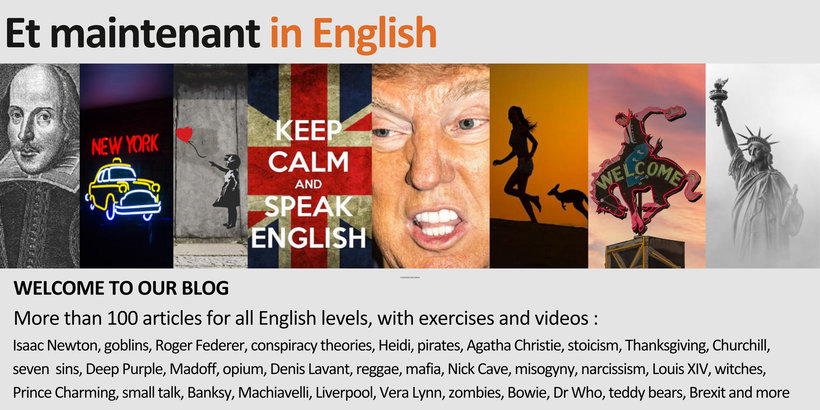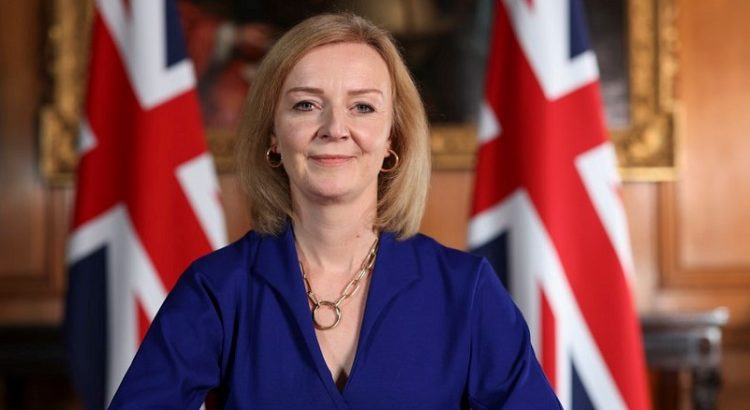Level B2 and above: On Liz Truss and British politics, with vocabulary and phrases, video
The appointment of Elizabeth Truss as UK Prime Minister on September 6 was almost immediately eclipsed by the death of Queen Elisabeth two days later. The Queen’s reign of 70 years is in sharp contrast to the revolving door (porte tournante) of Prime Ministers. Truss is the fourth in just over six years.
Written and compiled by Benedicte Gravrand, English trainer at The Language House in Geneva
The Conservative party (the Tories) returned to power in 2010 with David Cameron, who was re-elected in 2015 (PMs are elected for a five-year term); but following the results of the Brexit referendum in June 2016, he resigned.
Theresa May took over, was later re-elected in a general election, and served a total of three years. She tried her best to finalise the Brexit negotiations. After versions of her draft withdrawal agreement were rejected by Parliament three times, she resigned and was succeeded by Boris Johnson in 2019, who also served for three turbulent years.
See our vocabulary list below for the words in bold.
Johnson almost finalised the Brexit withdrawal agreement with great difficulty as nobody could agree on the Irish position and other details. During the Covid pandemic crisis, he went to staff parties while the country was in lockdown and then lied about it. Voters and politicians grew tired of him, several ministers resigned, and so he was forced to resign too.
Related blog: Au revoir Boris the Johnson
The Tory party chose Liz Truss to succeed him as the fourth Tory Prime Minister since Cameron. (The next general elections should be held in early 2025 – unless one is called earlier.)
I’ll spare you the details of her political life, but suffice to say, all the mistakes the incumbent PM has ever made – as well as her tendency to change views and parties – were in print the day after she was elected, thanks to the diligence of British tabloids. The French press called her the Iron Weathercock (girouette), in contrast to her political idol former PM Margaret Thatcher who was called the Iron Lady.
Incidentally, “truss” in the English dictionary means: a wooden or metal frame that supports a structure (such as a roof or bridge), or, a medical belt worn by someone with a hernia. Is it a coincidence that the Tories chose someone whose name that has those connotations? Did they subconsciously vote to “support” the party, or to curb the weakness or illness of the country?
Badly run country
As the prime ministers quit and succeed each other rapidly, the government seems less serious, less moral, and more like a soap opera. Meanwhile, the country is not being run properly.
The voters are growing frustrated and dissatisfied. And they are suffering economically.
For example, the price of food and energy is rising drastically. Regulators have said that the average energy bill will reach £3,550 (CHF3,850) in October this year, compared with £1,400 a year ago. And in January 2023, it’s expected to go up again to £4,260. Furthermore, from 2008 to 2021, the number of food banks (banques alimentaires) users increased every year, from just under 26,000 to 2.5 million. Food banks are currently running out of food and turning people away.
A country needs some degree of stability to function properly. Leaders should be examples dignity, professionalism, devotion to service, pragmatism, authenticity – in other words, leadership. But since 2010, (or since 2007 with Gordon Brown), there has been nothing but resignations, bickering, the hyping of false facts (the Brexit campaign), self-interest and confusion.
The people will revolt. This has already started with the numerous strikes going on and campaigns like Don’t Pay UK.
What people think of Truss
So Liz Truss comes at a time when every single voter seems to be sick of politics. A quick poll (sondage) among my British friends revealed a lot of unpleasant comments. This is what they said:
- “Ugh, awful, things are going from bad to worse in the UK.”
- “I loathe her. As foreign secretary, she was a relief after Boris (who was a loose cannon). As a PM, she is wooden and irritates me with her right-wing comments… We are in a very big mess here.”
- “Boris’ protégé. Puppet (The country has been) led by self-interested, self-promoting, delusional megalomaniacs… Plus she had an extra-marital affair with another member of parliament. (That’s) hardly setting a good example.”
- “Another crap cabinet of her supporters. Which further limits the talent available to even more minor non-entities.”
- “Shapeshifter. Only cares about power. Surrounded by similar lowlife The UK is turning into a third-world country. (The country has been) led by poor leaders starting with Cameron. They are unserious, utterly corrupt (corrompus).”
- “My biggest fear is that she will be a useful idiot to foreign powers. She’s out of her depth. And a total flip-flopper. U-turns every five minutes…. Can’t see things improving long term.”
- “Can’t see much changing with the new PM. We’ve been virtually leaderless over the past two months while the Tory party went through this shambles. The Tories today are more the Brexit party. They have gone very far to the right and they are populist. All the more serious politicians in their ranks have been more or less ousted.”
And a quick look at Twitter will reveal most people on that platform have become doomsayers.
Some somewhat more positive thoughts:
- In a sense, it is very exciting because the UK is arguably mostly influenced by global trends and so is likely to be at the vanguard (avant-garde) of how to adapt to the (world’s) changes, said an investor.
- The good thing for Truss is that expectation is so low that there is a risk she could become likeable or, dare I say, popular if she gets a few things right.
Good luck, Liz Truss. I hope you will prove your mettle.
For an overview of the state of the UK, watch this video (with sub-titles):
Jonathan Pie: Welcome to Britain. Everything is Terribe (NYT Opinion)
To subscribe to our blog, leave your email address
(right-hand side column – or at the bottom
of this blog if you are using a smartphone) and
confirm your subscription when you receive our email
Vocabulary
- Resign: (verb) to state formally that you are leaving a job permanently. It now seems clear that she will resign her directorship immediately.
- Draft: (noun) (in this context) something such as a plan, letter, or drawing that may have changes made to it before it is finished. I showed David a draft of the letter and he suggested a few changes.
- Withdrawal: (noun) (in this context) the act of no longer being involved in something. Illness led to her withdrawal from the contest.
- Suffice to say: (phrase) used for saying that the statement that you are making contains your main idea, although you could say more about it. Suffice it to say that working with Kelvin was not a very pleasant experience.
- Incumbent: (noun) someone who has an official position. the campaign to re-elect the incumbent.
- Connotation: (noun) an additional idea or emotion that a word suggests to you, in addition to its literal or main meaning. The term ‘cult’ has heavily negative connotations.
- Curb: (verb) to control or limit something that is harmful. Increased interest rates should curb inflation.
- Run: (verb) (in this context) to control and organize something such as a business, organization, or event. Sue’s been running a mail-order business for ten years.
- Hype: (uncount. noun) the use of a lot of advertisements and other publicity to influence or interest people.
- Strike: (noun) a period of time during which people refuse to work, as a protest about pay or conditions of work. A strike by transport workers was launched on August 12th.
- Lack: (uncount. noun) a situation in which you do not have any, or enough, of something that you need or want. The match was cancelled because of lack of support.
- Bicker: (verb) to argue about things that are not important. Children bickering with each other over whose turn is next.
- Loathe: (verb) to dislike someone or something very much.
- Loose cannon: (noun) someone who tends to do unexpected things that could cause problems for the other team members. She was widely regarded as something of a political loose cannon.
- Wooden: (adj.) (in this context) an actor who is wooden does not express enough emotion in their performance. his wooden delivery of the lines.
- Right-wing: (adj.) considered to be conservative in your political views.
- Mess: (noun) (in this context) a difficult situation with a lot of problems, especially because people have made mistakes. The company was in a complete mess when she took over.
- Puppet: (noun) (in this context) a person or government that a more powerful person or government supports and controls. The country was regarded as a US puppet.
- Crap: (noun / adj. – impolite) nonsense / bad in quality.
- Shapeshifter: (noun) (in mythology and folklore) a person who is able to turn into another creature. He was a shapeshifter who looked like a human being during the day.
- Lowlife: (noun informal) a bad person, esp. a criminal.
- Out of your depth: (phrase) in a situation that you cannot deal with because it is too difficult or dangerous. Her boss seemed to be out of his depth.
- Flip-flop: (American – informal) someone changing their opinion completely in a way that annoys other people.
- U-turn: (noun) a sudden and complete change of policy by a government or by someone in authority. The government was today accused of doing a U-turn after its decision not to raise petrol prices after all.
- Shambles: (noun – sing.) something that is very badly organized and that does not operate effectively. Government corruption has left the economy in a shambles.
- Ranks: (noun, plural) (in this context) all the people within a group, organization etc. This reversal of policy touched off a violent dispute within the party ranks.
- Oust: (verb) to remove someone from a position of power, especially in order to take that position. The president was ousted in a coup last year.
- Doomsayer: (noun – informal) someone who always says that bad things will happen.
- Dare I say: (phrase) used when you are saying something that others many not like: This famous novel is a little, dare I say it, dull.
- Mettle: (uncount. noun) the determination and ability to deal with problems and difficult situations. She has the opportunity to prove her mettle as a manager.
Vocabulary definitions from MacmillanDictionary.com


